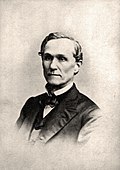This article relies largely or entirely on a single source . Relevant discussion may be found on the talk page. Please help improve this article by introducing citations to additional sources. Find sources: "1861 Alabama gubernatorial election" – news · newspapers · books · scholar · JSTOR (March 2021) |
The 1861 Alabama gubernatorial election took place on August 5, 1861, in order to elect the governor of Alabama. Democrat John Gill Shorter won his first term as governor.
Contents
| |||||||||||||||||
 County results Shorter: 50–60% 60–70% 70–80% 80–90% >90% Watts: 50–60% 60–70% 70–80% 80–90% Unknown/no vote: | |||||||||||||||||
| |||||||||||||||||


